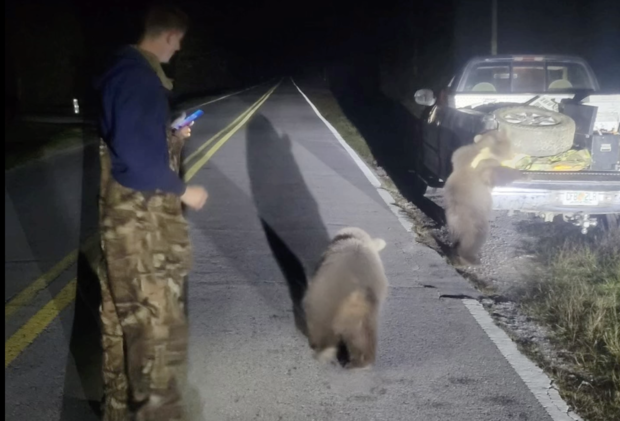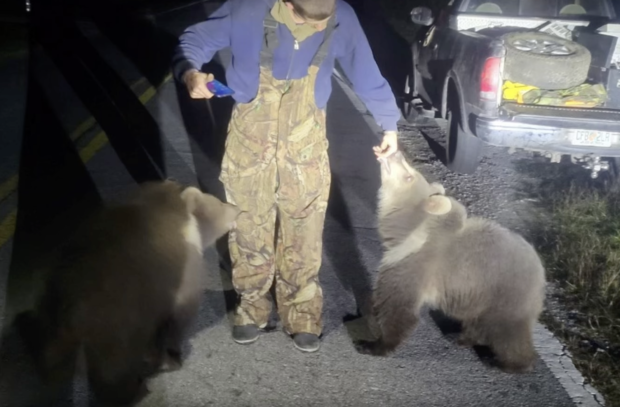Video shows bear cubs native to Alaska found wandering 3,614 miles away — in Florida
A Florida deputy came upon a strange sight when responding to a recent call in Baker County at 3:30 in the morning.
A man said that he spotted two bear cubs on the side of the road that didn't look like black bears native to the area. When the deputy arrived on scene, she met the man and the bears, who were looking to explore.
"They want to check out everything. They're completely friendly," the unidentified man can be heard saying.

Video shared by the Okaloosa County Sheriff's Office shows the encounter, including the bears approaching the deputy and man, and climbing on their cars.
The deputy and man both speculated that the animals were brown bears or grizzly bears. According to the sheriff's office, those thoughts were correct: The animals were Kodiak cubs, a unique subspecies.

They're also native to Alaska - which meant the cubs found by sheriff's office were about 3,614 miles away from home.
The deputy contacted Florida Fish and Wildlife, who were able to transport the cubs to a secure location for safekeeping. The agency also launched an investigation into how the cubs came to be in Florida. The sheriff's office said that they chose not to share the video of the encounter, which happened on Dec. 5, until the investigation was completed.
Are those grizzly bears!??? (Audio Up!) An Okaloosa County Sheriff’s Office deputy certainly wasn’t expecting what she found when answering a call in the Baker area around 3:30 in the morning December 5th. A man had spotted two bear cubs on the side of Old River Road and said they didn’t appear to be our common Northwest Florida black bears. Turns out he was right. These cubs were technically about 3,614 miles from what would normally be "home" - in Alaska. They are apparently Kodiak cubs, a unique subspecies of the brown or grizzly bears, although Kodiaks are larger. Thankfully this pair was friendly and appeared healthy. The OCSO contacted the bear experts, Florida Fish and Wildlife, who made sure the cubs were transported to a secure location for safekeeping while they conducted a thorough investigation into how they came to be on the side of a road. It was determined the bears had escaped from an inadequate enclosure at a residence on Old River Road where a self-proclaimed bear trainer lives. The resident faces various Florida wildlife violations related to the findings of the FWC investigation. We opted not to share the video until after their investigation was closed. • According to the Alaska Department of Fish and Game “Kodiak bears are a unique subspecies of the brown or grizzly bear and in the wild live exclusively on the islands in the Kodiak Archipelago and have been isolated from other bears for about 12,000 years. • There are about 3,500 Kodiak bears; a density of about 0.7 bears per square mile. • Kodiak bears are the largest bears in the world. A large male can stand over 10' tall when on his hind legs, and 5' when on all four legs. They weigh up to 1,500 pounds. Females are about 20% smaller, and 30% lighter than males.”
Posted by Okaloosa County Sheriff's Office on Wednesday, January 31, 2024
Florida Fish and Wildlife determined that the bears had escaped from "an inadequate enclosure at a residence on Old River Road where a self-proclaimed bear trainer lives," according to the sheriff's office. That resident, who was not identified by the sheriff's office, now faces "various Florida wildlife violations" related to the investigation's findings.
According to the Alaska Department of Fish and Game, the bears live exclusively on the Kodiak Archipelago in Alaska, and have been isolated from other bears for over a millennium. There are about 3,500 such bears in the area. Kodiaks are larger than brown or grizzly bears, according to the Alaska Department of Fish and Game, and male bears of the species can be over 10 feet tall when standing on their hind legs.
- In:
- Florida
- Alaska
- Animal Rescue

Kerry Breen is a reporter and news editor at CBSNews.com. A graduate of New York University's Arthur L. Carter School of Journalism, she previously worked at NBC News' TODAY Digital. She covers current events, breaking news and issues including substance use.
TwitterDisclaimer: The copyright of this article belongs to the original author. Reposting this article is solely for the purpose of information dissemination and does not constitute any investment advice. If there is any infringement, please contact us immediately. We will make corrections or deletions as necessary. Thank you.




